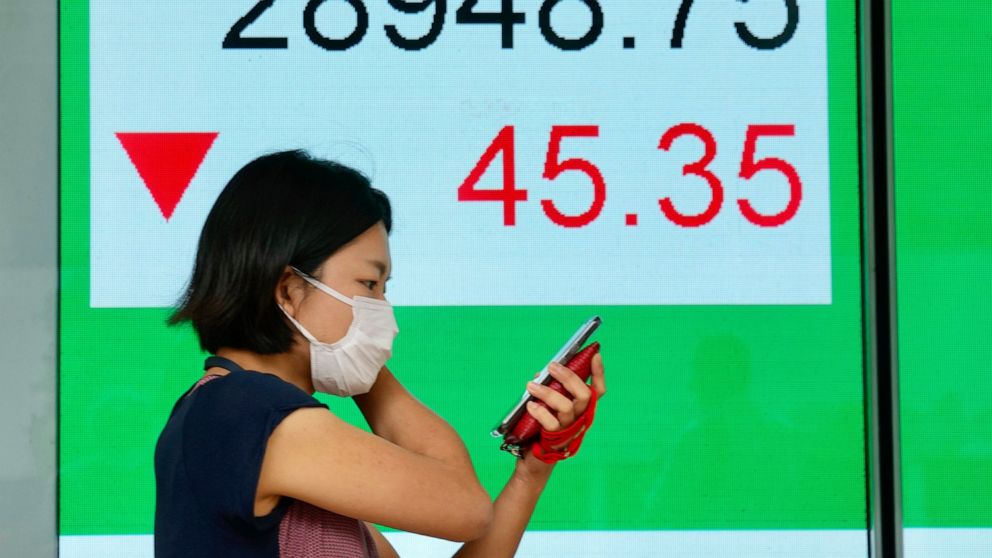Wall Street closes out its 5th straight quarterly gain
BANGKOK — Wall Street closed out its fifth straight quarterly gain Wednesday, continuing its comeback from a steep drop in early 2020 at the onset of the coronavirus pandemic.
The S&P 500 edged up 0.1%, bringing its advance over the past three months to 8.2% and 14.4% for the first half of the year. The benchmark index finished June with a 2.2% gain and its third straight all-time high as it extended its winning streak to a fifth day.
Stocks have been pushing higher on optimism that the economy is strengthening and that the Federal Reserve will keep interest rates low for a while longer.
“The Fed has sort of kept the proverbial spigot open, if you will, with liquidity, so there’s still a pretty sizable amount of capital out there looking for a place to go,” said Randy Frederick, vice president of trading & derivatives at Charles Schwab.
Meanwhile, concerns about inflation earlier this year have dissipated somewhat, as investors have become increasingly convinced that the rise in prices for everything from food to oil to lumber is temporary and a result of the U.S. economy recovering from the pandemic.
Trading Wednesday was relatively subdued as investors wait for the government’s monthly jobs report due out Friday.
“We’re definitely in the doldrums of summer; volatility and volume will probably be pretty light,” said Jason Pride, chief investment officer of private wealth at Glenmede.
The S&P 500 index rose 5.70 points to 4,297.50. The Dow Jones Industrial Average added 210.22 points, or 0.6%, to 34,502.51. The Nasdaq composite fell 24.38 points, or 0.2%, to 14,503.95. The tech-heavy index hit record highs on Monday and Tuesday.
The Russell 2000 index of small company stocks rose 1.71 points, or 0.1%, to 2,310.55.
Many professional investors along Wall Street say stocks can keep rising from here, just not as much as they did during the first half of the year.
Interest rates remain low, even if the Federal Reserve recently indicated it could start raising rates in about two years. And with the economy continuing to strengthen, supporters say stocks should be able to tick higher even if their prices have climbed faster than corporate profits and look expensive compared with history.
At the Wells Fargo Investment Institute, for example, the forecast is for record corporate earnings this year to help the S&P 500 rise to between 4,400 and 4,600 by the end of 2021. That would mean a gain between 2.4% and 7% from the index’s current level of 4,297.
Some are more pessimistic, though, amid concerns that several measures of growth in the economy have already hit their peak.
Barry Bannister, chief equity strategist at Stifel, says U.S. manufacturing growth likely topped out in March, for example. He sees the recent pullback of stimulus in China leading to slower growth around the world and helping to knock the S&P 500 down to 3,800 in the second half of the year.
So far this year, energy stocks continue to lead the way higher among the 11 sectors in the S&P 500 with a gain of 42.4%. Financials are the next-biggest gainer, up 24.5%, while real estate companies are up 21.7%. Technology companies, the biggest gainers in 2020, are up 13.2%. Utilities lag the rest of the market through the first half of this year with a gain of 0.8%.
As inflation concerns have receded through much of the quarter, that’s helped push solid gains for technology companies. Tech stocks have been the biggest gainers in the S&P 500 this quarter with a 12.9% rise. The sector is viewed as a high-growth area of the market, which tends to do better when inflation is low.
“Inflation expectations got too high,” Pride said. “When they backed off, that was kind of a natural thing.”
Meanwhile, some rising concerns over COVID-19 variants also prompted investors to put more money into the sector, which did particularly well during the height of the pandemic.
For the April-June quarter, American Express led the way higher among the 30 stocks in the Dow with a 17.8% gain. Goldman Sachs Group was a close second-best with a 16.1% advance. Intel fared the worst, losing 12.3%.
Industrial, financial and energy companies were among the winners Wednesday. Those gains were kept in check by a pullback in technology, communication and real estate stocks.
Treasury yields mostly fell. The yield on the 10-year Treasury note fell to 1.47% from 1.48% late Tuesday.
Crop prise rose after the government reported that U.S. farmers planted fewer acres of corn and soybeans than had been expected.
Investors got another dose of good economic news on Wednesday when payroll processor ADP said the private sector created 692,000 jobs last month. above economists’ forecasts. The big jobs data point will come on Friday, when the monthly jobs report is released. Economists are expecting employers created 675,000 jobs last month, and the unemployment rate fell to 5.7%.
Didi Global, a Chinese ride-hailing service, rose 1% in its U.S. stock market debut. The company’s initial public offering of 288 million shares was priced at $14 a share.
![]()


